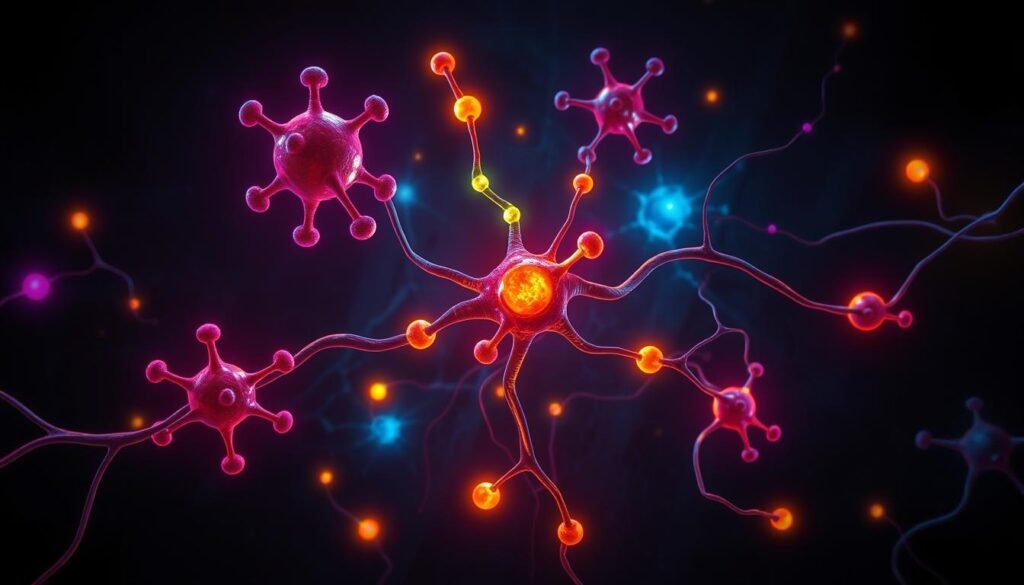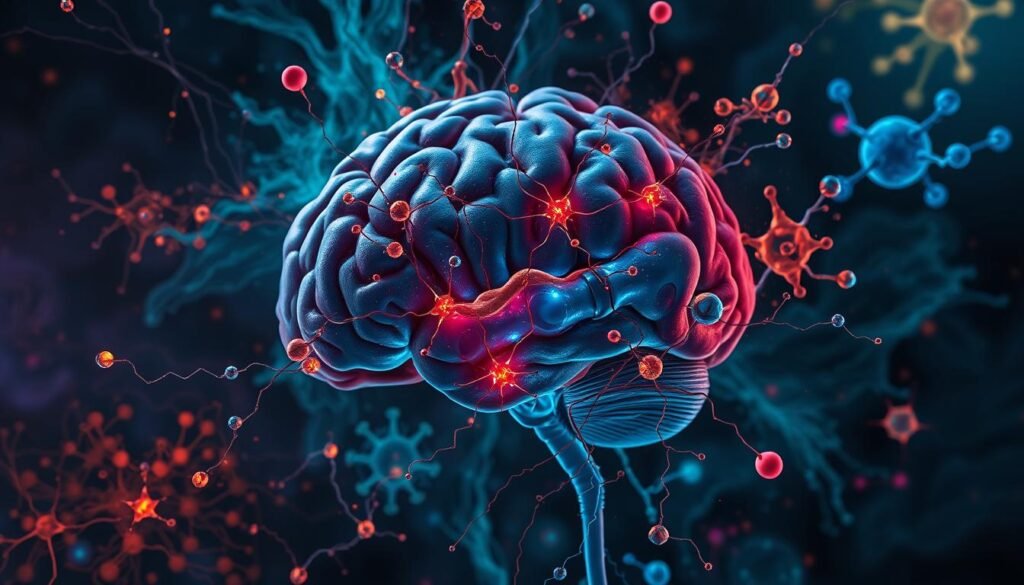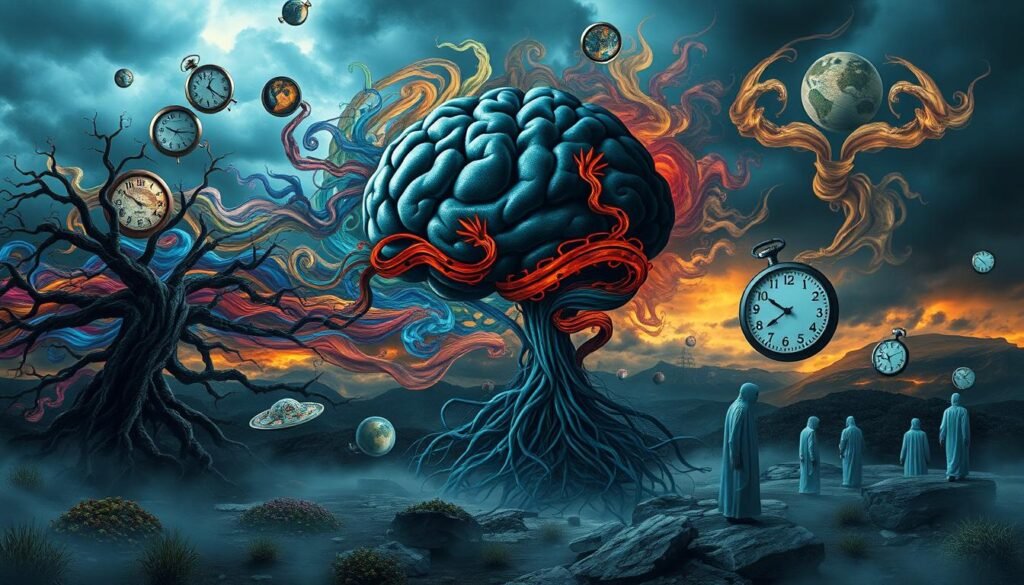About 46.6 million adults in the United States are impacted by mental health disorders. The idea that anxiety might stem from a chemical imbalance has gained a lot of focus. This view suggests that changes in brain chemicals could lead to anxiety disorders.
Indeed, levels of neurotransmitters such as serotonin and GABA are linked with anxiety. However, recent studies show that many factors play a role. These include genetics, environmental stressors, and personal life events. Understanding the dynamic between brain chemistry and anxiety helps in finding effective treatments.
Key Takeaways
- Mental health disorders impact millions of Americans.
- Both genetic and environmental factors contribute to anxiety disorders.
- Neurotransmitter imbalances may influence anxiety, but are not the sole cause.
- Effective treatment often combines medication, psychotherapy, and self-help strategies.
- Understanding anxiety involves considering multiple influences beyond just brain chemistry.
The Basics of Anxiety Disorders
Anxiety disorders include conditions like Generalized Anxiety Disorder and Panic Disorder. They cause persistent anxiety that impacts daily life. Anxiety comes from many sources, including genetics and life changes.
Knowing the symptoms of anxiety is key. Symptoms include worry, restlessness, and irritability. People also feel physical signs like a fast heart rate and muscle tension. For many, anxiety harms their daily lives.
Anxiety disorders are complex. They involve genetics, personal experiences, and external stress. It’s not just about brain chemicals. Understanding these factors helps us grasp anxiety disorders better.
| Type of Anxiety Disorder | Common Symptoms |
|---|---|
| Generalized Anxiety Disorder | Persistent worry, fatigue, irritability, sleep issues |
| Panic Disorder | Heart palpitations, sweating, trembling, fear of dying |
| Social Anxiety Disorder | Intense fear of social situations, avoidance behavior |
| Specific Phobias | Irrational fear of specific objects or situations |
Understanding Brain Chemistry and Anxiety
Brain chemistry plays a big role in how we feel, especially with anxiety. Different chemicals in our brain work together to control our mood and emotions. Serotonin and GABA are very important for keeping our emotions stable.
Serotonin helps us feel happy and relaxed. If we don’t have enough serotonin, we might feel more anxious. That shows how crucial it is for our mental health. GABA, on the other hand, helps calm our brain by balancing out the active signals. When GABA isn’t working right, we might feel more anxious and too excited.
Research shows that the relationship between neurotransmitters and anxiety is complex. It’s not just about serotonin and GABA levels. Anxiety disorders also involve changes in how our brain is structured. For example, the limbic system, which controls emotions and mood, can affect anxiety.
Norepinephrine, another neurotransmitter, also plays a role in how we handle stress. This impacts anxiety disorders. Understanding all these connections is key to finding good treatments for anxiety.
What Chemicals Are Involved in Anxiety?
Getting to know the neurotransmitters involved in anxiety helps us see how chemicals affect mood. Key ones are serotonin, GABA, and norepinephrine, which all play roles in anxiety.
Serotonin, the “happy hormone,” keeps mood stable and helps with sleep. If serotonin levels drop, anxiety and depression might increase. This shows why it’s so important for emotional well-being. GABA, on the other hand, calms the nervous system. Not enough GABA can lead to anxiety or panic.
Norepinephrine boosts heart rate and sweating when stressed. This reaction is why stressful situations make people anxious. Dopamine also plays a part in controlling anxiety. It works in various brain areas to help regulate emotions.
Endorphins also help by stabilizing mood and promoting relaxation. They support how we cope with stress. Choices we make, genetic factors, and our environments also influence these chemicals. Finding the right treatment can bring these chemicals into balance. This balance improves life for those dealing with anxiety.

Understanding these chemicals’ roles gives insight into anxiety disorders. Treatments, like psychotherapy or medications, work by adjusting these chemical levels. To learn more about how brain chemistry and anxiety are connected, check out this study.
Is Anxiety a Chemical Imbalance?
Is anxiety a result of a chemical imbalance? This question is often debated by scientists and mental health experts. The chemical imbalance theory argues that problems with neurotransmitter levels can cause mental health issues, like anxiety. Research has found that people with anxiety usually have different levels of neurotransmitters like serotonin and GABA.
Evidence Supporting Chemical Imbalance Theory
Many believe in the chemical imbalance theory because of certain findings. For example, lower serotonin levels are linked to more anxiety and depression. Selective serotonin reuptake inhibitors (SSRIs) work by increasing serotonin levels, which helps reduce anxiety symptoms. Neurotransmitters play a key role in how nerve cells talk to each other, affecting our emotions.
Limitations of the Chemical Imbalance Theory
However, the idea of chemical imbalances as the main cause of anxiety is not bulletproof. More recent studies argue against the view that neurotransmitter issues alone explain anxiety. It’s hard to diagnose a chemical imbalance since no reliable tests exist. Diagnoses are mostly based on visible symptoms and context, not direct brain chemical measurements.
Genetics, environment, and personal history also significantly influence anxiety. To better understand mental health, exploring how lifestyle changes like B vitamins affect it is useful.

Other Causes of Anxiety Disorders
Anxiety disorders come from more than just chemical imbalances. They emerge from a mix of genes and what happens around us. Understanding this can help tackle anxiety better.
Genetic Factors
Our genes play a big role in anxiety disorders. If anxiety runs in the family, you might be more likely to have it too. Researchers have found that the chance of getting panic disorder goes up by 5.7% to 17.3% if a family member has it.
This link to our family history is important to think about when looking for ways to treat anxiety. Also, inheriting low levels of serotonin can affect our moods and make us more anxious. That’s why doctors consider our genetic background when planning our treatment.
Environmental Influences
What happens to us also shapes our anxiety. This includes tough times like losing a job or having problems in relationships. It’s crucial to recognize these outside pressures.
Learning to handle stress well can help ease anxiety symptoms. This is especially true for those who are genetically more prone to anxiety disorders.

| Factor Type | Details |
|---|---|
| Genetic Factors | Familial history increases risk; 5.7% to 17.3% risk for relatives of those with panic disorder |
| Environmental Influences | Traumatic childhood experiences; ongoing stressors like job loss; relationship issues |
| Neurotransmitter Levels | Low serotonin associated with anxiety; can be inherited or caused by anxiety itself |
| Treatment Considerations | Multidimensional approach required; combination of genetic, environmental, and chemical factors |
Common Anxiety Symptoms
Many people with anxiety disorders face both emotional and physical symptoms. Common anxiety symptoms include feeling nervous and worrying a lot about different things. People often feel restless, tired, and easily annoyed.
They might find it hard to focus. Physical signs, like a fast heartbeat, breathlessness, and tight muscles, are common too. These symptoms can change in strength. Recognizing them early is key to getting better.
Studies show substances like serotonin and dopamine affect our feelings and mental health. Not enough serotonin can lead to anxiety and sadness. And, if dopamine levels are off, it might cause social anxiety. It’s helpful to know this to understand anxiety better.
When dealing with common anxiety symptoms, professional help is important. Treatments like cognitive behavioral therapy (CBT) and medicines can help. People often use antidepressants, like SSRIs, to improve serotonin levels and decrease anxiety.
Making lifestyle changes is also helpful in managing anxiety. It’s good to do things you enjoy and get professional advice when needed. If not treated, anxiety can get worse and lead to depression or drug abuse. For more on natural anxiety treatments, check out this guide for different options.
Anxiety Treatment Options
Tackling anxiety often means using several methods that fit a person’s unique needs. It helps to mix traditional and alternative ways to handle symptoms better. Let’s look at the main treatments for anxiety recognized today.
Medication
There are many medicines available to help with anxiety, aimed at easing symptoms and helping with daily life. Among them are:
- Antidepressants: Some help balance brain chemicals.
- Buspirone: A non-benzodiazepine drug that helps with anxiety.
- Benzodiazepines: Sedatives offering quick relief for severe symptoms.
- Beta blockers: They help control physical signs of anxiety, like a fast heartbeat.
Psychotherapy
Psychotherapy is key in treating anxiety effectively. Cognitive Behavioral Therapy (CBT) is especially good for different anxiety problems. It works by changing negative thinking and dealing with trauma or stress impacts. Therapists use tailored strategies to fight specific fears.
Self-Help Strategies
Besides expert help, self-care is vital in handling anxiety. Such practices include:
- Regular exercise to fight stress and improve mental health.
- Mindfulness practices like meditation and deep breaths.
- Keeping a balanced diet and sleeping well.
- Joining support groups for shared stories and backing.
- Using time management to lessen daily stress.
Using both medication, therapy, and self-care together can truly help manage anxiety better. It improves life quality greatly.
Conclusion
Many people think anxiety is just about chemicals in our brain. But it’s more complex. Anxiety involves our genes, our environment, and our thoughts. We need to look at all these factors to truly understand and treat it.
Therapies like cognitive-behavioral therapy can physically change our brains. Studies using MRIs and CT scans show this. It’s not just about taking medicine. We have to address the root causes of anxiety in our lives.
In the end, asking if anxiety is a chemical imbalance is too simple. We have to view it as part of a bigger picture. With more research and personalized care, we can help those suffering from anxiety. Encouraging activities like exercise and mindfulness is also key to overcoming anxiety.